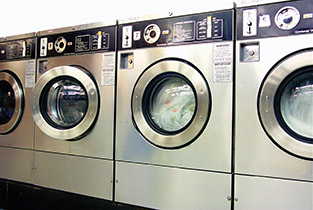
Sustainable Laundry Best Practices
A new ASTM International standard identifies and defines sustainable laundry best management practices that are used by commercial laundry facilities to reduce their impact on the environment. D7841, Practice for Sustainable Laundry Best Management Practices, was developed by Subcommittee D13.40 on Sustainability of Textiles, part of ASTM International Committee D13 on Textiles.
"D7841 incorporates the best management practices most critical to laundries' conservation of natural resources," says Angela D. Freeman, manager, certification programs, TRSA, an international organization representing companies that supply laundered textiles to a wide variety of businesses. "The more of these that a laundry can implement, the less water, electricity, natural gas, fuel oil and other utilities they require from public sources."
Among the 16 best management practices listed in D7841 are the following:
- Water Reuse Technology - Technology or equipment within a laundry facility that reuses, reclaims or recycles water.
- Boiler Heat Recovery - Technology or equipment within a laundry facility that recovers heat produced from the facility's water boiler system.
- Energy Efficient Low-Temperature Detergents - Detergents that are effective in eliminating pathogenic bacteria at low-wash temperatures.
- Alternative Energy - Solar or geothermal energy that clearly provides a minimum of 10 percent of the electrical energy used in the laundry.
- Fleet Vehicle Route Optimization - Use of software or technologies to maximize the efficiency of routes driven by fleet vehicles.
- Recycling Programs - Qualified waste recycling programs within a laundry facility.
Freeman, a D13.40 member, says industries that rely on the use of delivered laundered textiles will be the primary users of D7841. "We expect D7841 to build awareness in the textile services marketplace of laundry sustainability, not only as an indicator of a provider's longevity, but their ability to produce cost-effectively," says Freeman.
Interested parties are welcome to join in the standards developing activities of D13.40, including the ongoing maintenance of D7841.
"We are interested in scientists who have worked with environmental standards initiated by associations representing business-to-business trades," says Freeman. "We are also seeking participation from businesses that offer some type of cleaning (particularly detergent use), operate truck fleets or pretreat wastewater from their industrial processes."
To purchase ASTM standards, visit www.astm.org and search by the standard designation, or contact ASTM Sales (phone: 877-909-ASTM; sales@astm.org).
CONTACT Technical Information: Angela D. Freeman, TRSA • Alexandria, Va. • Phone: 703-519-0029, ext. 111 | ASTM Staff: Jennifer Rodgers • Phone: 610-832-9694 | Upcoming Meeting: Jan. 26-29, 2014 • January Committee Week • Houston, Texas
 SN Home
SN Home Archive
Archive Advertisers
Advertisers Masthead
Masthead RateCard
RateCard Subscribe
Subscribe Email Editor
Email Editor